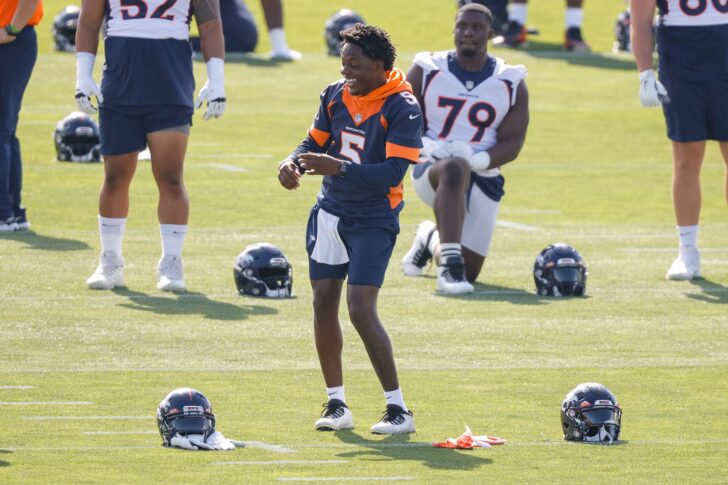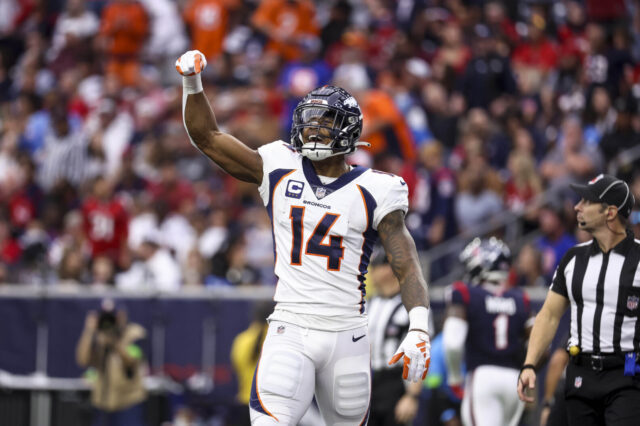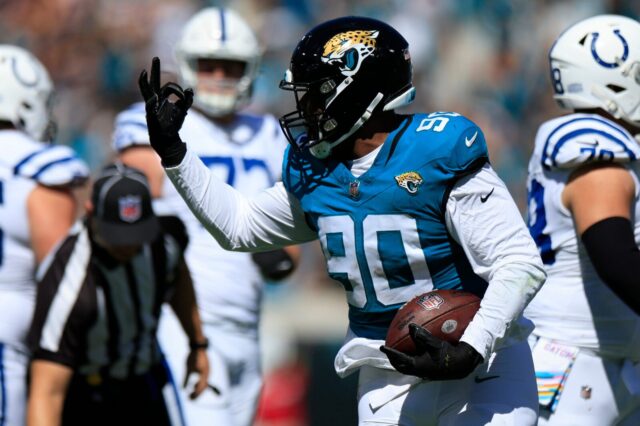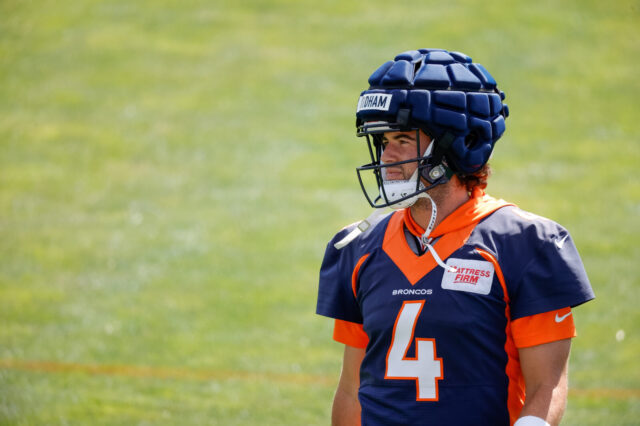Teddy Bridgewater has been officially named the starting quarterback of the 2021 Denver Broncos.
In a spirited back and forth competition ended between Bridgewater and incumbent Drew Lock, the challenger came away victorious.
Coach Fangio informed our team this morning that Teddy Bridgewater will be the Broncos’ starting quarterback. pic.twitter.com/ZU0hNCi0kg
— Denver Broncos (@Broncos) August 25, 2021
Choosing the seven-year veteran over the 24-year old is a win-now message from the staff.
Bridgewater played well this preseason, dazzling in his last preseason effort. However, many would make the case it was not appreciably better than Lock.
Each player won a round during the team’s first two preseason games adding to the “even-Steven” description provided by Fangio throughout camp.
So what changed? Bridgewater’s play during camp, his classroom work and preseason play swayed the head man into choosing him as the best option.
Why did Fangio pick Bridgewater?
Simply put, they know what he is and what he is not. Coaches appreciate predictability and have the confidence to game plan around skill sets and minimize deficits, assuming they know what they are. On the other hand, Lock provided the typical boom-or-bust proposition of a young quarterback.
The all-or-nothing volatility rubbed Fangio and his staff the wrong way last season and impacted how they wanted 2021 to play out. This is especially amplified by the emphasis this team must be a playoff team, at minimum. If not, it is safe to assume the head coach, and most of his staff will be moving on after the year.
Bridgewater has superior leadership qualities. His ability to manage the huddle and the media is an indication of his savvy. There is no doubt the staff preferred a veteran who could handle the trials of an NFL season to lead this team in 2021.
What does this mean for the offense?
In 2019, Bridgewater started five games for the New Orleans Saints, going 5-0. He played effectively, with most of his throws designed to be short of the sticks. Though his passer rating was a robust 99.1, his QBR was an average of 50.9 because he only averaged 153.8 yards per game.
His play that season was parlayed into that new contract and starting gig in Carolina in 2020.
Last season Bridgewater was an effective and efficient passer. The former Carolina Panthers’ starting quarterback had a completion percentage of 69.1% and a passer rating of 92.1. His QBR increased to 64.2 in 2020.
Additionally, many would believe that the majority of his passes went to running backs, yet it was not the case in 2020.
The team’s top three pass catchers were D.J. Moore, Robby Anderson, and Curtis Samuel; all play the wide receiver position. Both Moore and Andrson had over 1,000 yards receiving and Samuel was close behind with 851.
This bodes well for Courtland Sutton, Jerry Jeudy, and K.J. Hamler, who all share traits similar to Bridgewater’s former receiving group.
Bridgwater’s minimal arm strength will most likely limit Sutton and Hamler’s impact on deep routes. Yet, the veteran’s anticipation will help Jeudy and others in the short to the intermediate passing game. Offensive coordinator Pat Shurmur must feel comfortable in highlighting Bridgewater’s intermediate game instead of Lock’s deep ball.
The jury is still out on the impact Bridgewater starting will have on tight ends Noah Fant and Albert Okwuegbunam.
Fant, the former first-round selection in 2019 should be a focal point in the team’s passing game. Fant has yet to catch a preseason pass so it may be tough to identify how their connection will unfold.
Okwuegbunam is a player who catches the ball above the rim. He is great in tight windows and should excel making plays in traffic. Bridgewater is a more conservative passer and will most likely shy away from putting too many balls into harm’s way. That alone may limit the former Missouri star’s impact on the offense this season.
Additionally, Bridgewater’s limited success with tight ends last season creates some doubt. For this team to be successful in the red zone, the top two tight ends on the Broncos must be factors.
The preseason has shown Bridgewater will utilize his outlets, meaning the running backs will get a lot of looks in the passing game. Look for Melvin Gordon, Javonte Williams and Royce Freeman to get their fair share of targets.
The most important factor Bridgewater brings to the offense is his ability to help the team stay in manageable down and distance. Staying “on schedule” has been an issue for the Broncos offense dating back to 2015.
Bridgewater’s ability to pick up a first down or two per drive must be appealing to a defensive coach with the talent Fangio has at his disposal. Last season the Bridgewater-led offense in Carolina was the sixth-best play-per-possession team in the NFL as the Broncos ranked near the bottom with Lock (31st).
The new starter will get the team into the right play which will maximize the running game while minimizing negative plays. Fangio sees the appeal and wants the offense to play complementary football. It may not light up a scoreboard but should produce winning football.
What does this move mean for the Broncos’ organization?
The team has chosen a known commodity (Bridgewater) over the unknown (Lock). This move indicates a few things. First, the coaching staff believes they have to win this season. There are no assurances they will be around next season, so hoping Lock continues to develop is a risk the coaching staff is no longer willing to accept.
Next, it means the scrutiny general manager George Paton has had since the draft will increase again. It was widely believed the team had hope Lock could continue to develop. With Lock developing from the bench it makes passing on quarterbacks in the draft a more questionable decision.
Not selecting Justin Fields or Mac Jones will now weigh heavily into the assessment of Paton if Bridgewater does not turn into a player he has yet to become, a franchise quarterback.
Bridgewater’s profile does not fit a franchise quarterback, therefore one can now assume the team will be back into the market again next offseason.
If the team wins too many games it could make it difficult to secure a high enough draft pick for Paton’s next target in the draft.
Additionally, if the pending free agent Bridgewater plays really well his price tag will only go up. This means he may play himself out of Denver. Lock developing on the bench is unlikely and could be on move on after the season for a fresh start.
Paton gave his head coach the keys to the season. Fangio made the decision he thought is best for this season and his future.
Conclusion
In the end, what cannot be lost is Bridgewater earned the right to play. If his play in training camp and the preseason is any indicator, Broncos Country can expect the offense will be productive.
He is an efficient passer and has shown he can win with adequate talent (Minnesota in 2014-2015, and New Orleans in 2019). Bridgewater suffered a knee injury midseason in 2020 and it visibly impacted his play. The team believes he’s healthy and will perform the way he did in the ten games before being hurt. He was a 72 percent passer while averaging 255.2 passing yards per game with 13 touchdowns to 7 interceptions.
Also, the Broncos schedule sets up well for Bridgewater to gain traction passing.
last year, Teddy Bridgewater played the #1 most difficult schedule of pass defenses
>> he played 11 games against top-15 pass defenses
this year, the Broncos are projected to play the #1 easiest schedule of pass defenses
from #1 most difficult to #1 easiest
— Warren Sharp (@SharpFootball) August 25, 2021
Broncos fans expect the team to surprise offensively. Bridgewater should put up respectable numbers while the running game adds to a balanced attack.



